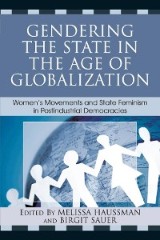Details

Gendering the State in the Age of Globalization
Women's Movements and State Feminism in Postindustrial Democracies|
CHF 57.00 |
|
| Verlag: | Rowman & Littlefield Publishers |
| Format: | EPUB |
| Veröffentl.: | 26.04.2007 |
| ISBN/EAN: | 9780742581401 |
| Sprache: | englisch |
| Anzahl Seiten: | 402 |
DRM-geschütztes eBook, Sie benötigen z.B. Adobe Digital Editions und eine Adobe ID zum Lesen.
Beschreibungen
<span><span>Gendering the State</span><span> is a ground-breaking collection of studies that examines the efforts of women in countries all over the world to frame public policy debates on nationally critical issues in gendered terms. This is the latest volume in the Research Network on Gender and the State (RNGS) collaborative studies. Using the RNGS model of women's movement and women's policy actor strategies to influence public policy debates and state response, the book looks at data gathered from ten European countries (including Finland and Sweden), plus Japan, Australia, Canada, and the United States from the 1990s to today.<br></span></span>
<br>
<span><span>The overall study is grouped into three distinct patterns of state change: state downsizing—particularly in social policy areas (Canada, Finland, the Netherlands, the United States, and Spain); expansion of state activities into previously less-regulated areas (Austria, France, Germany, and Sweden); and transformation—often constitutionally based—of representative structures (Australia, Belgium, Italy, Japan, and the United Kingdom). Examination of these patterns reveals the impact of the changes in state structures and national priorities on the effectiveness and ability of women's movement actors in achieving their goals.</span></span>
<br>
<span><span>The overall study is grouped into three distinct patterns of state change: state downsizing—particularly in social policy areas (Canada, Finland, the Netherlands, the United States, and Spain); expansion of state activities into previously less-regulated areas (Austria, France, Germany, and Sweden); and transformation—often constitutionally based—of representative structures (Australia, Belgium, Italy, Japan, and the United Kingdom). Examination of these patterns reveals the impact of the changes in state structures and national priorities on the effectiveness and ability of women's movement actors in achieving their goals.</span></span>
<span><span>Gendering the State</span><span> is a ground-breaking collection of studies that examines the efforts of women in countries all over the world to frame public policy debates on nationally critical issues in gendered terms. The overall study is grouped into three distinct patterns of state change: state downsizing—particularly in social policy areas (Canada, Finland, the Netherlands, the United States, and Spain); expansion of state activities into previously less-regulated areas (Austria, France, Germany, and Sweden); and transformation—often constitutionally based—of representative structures (Australia, Belgium, Italy, Japan, and the United Kingdom). Examination of these patterns reveals the impact of the changes in state structures and national priorities on the effectiveness and ability of women's movement actors in achieving their goals.</span></span>
<span><span>Chapter 1: Introduction: Women's Movements and State Restructuring in the 1990s <br>Chapter 2: Re-evaluating the Heart of Society: Family Policy in Austria <br>Chapter 3: Feminism and Indigenous Rights in Australia in the 1990s <br>Chapter 4: Speedy Belgians: The New Nationality Law of 2000 and the Impact of the Women's Movement <br>Chapter 5: New Federalism and Cracked Pillars: The Canadian Health Insurance System under the 2000 Romanow Commission and Beyond <br>Chapter 6: Debating Day Care in Finland in the Midst of an Economic Recession and Welfare State Down-Sizing <br>Chapter 7: Thirty-five Hour Workweek Reforms in France, 1997–2000: Strong Feminist Demands, Elite Apathy, and Disappointing Outcomes <br>Chapter 8: Women, Embryos, and the Good Society: Gendering the Bioethics Debate in Germany <br>Chapter 9: The Reform of the State in Italy <br>Chapter 10: Electoral Reform in Mid-1990s Japan <br>Chapter 11: The Home Care Gap: Neoliberalism, Feminism, and the State in the Netherlands <br>Chapter 12: The Women's Movement, State Feminism, and Unemployment Reform in Spain, 2002–2003 <br>Chapter 13: The Debate about Care Allowance in the Light of Welfare State Reconfiguration <br>Chapter 14: The UK: Reforming the House of Lords <br>Chapter 15: Welfare Reform: America's Hot Issue <br>Chapter 16: Conclusion: State Feminism and State Restructuring since the 1990s</span></span>
<span><span>Melissa Haussman</span><span> is associate professor in the Department of Political Science at Carleton University. </span><span>Birgit Sauer</span><span> is professor of political science at the University of Vienna.</span></span>

















